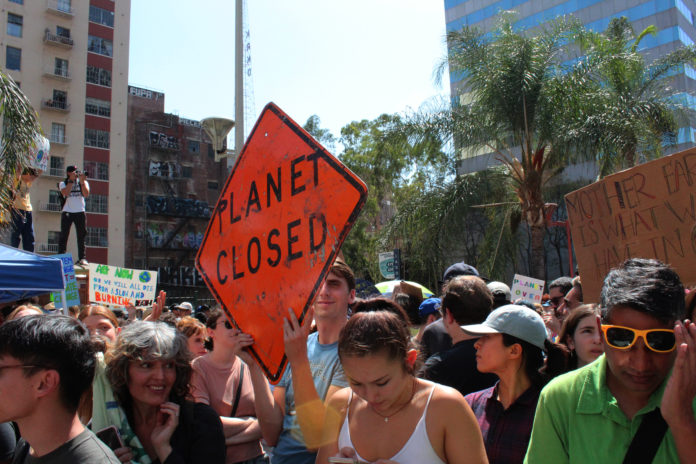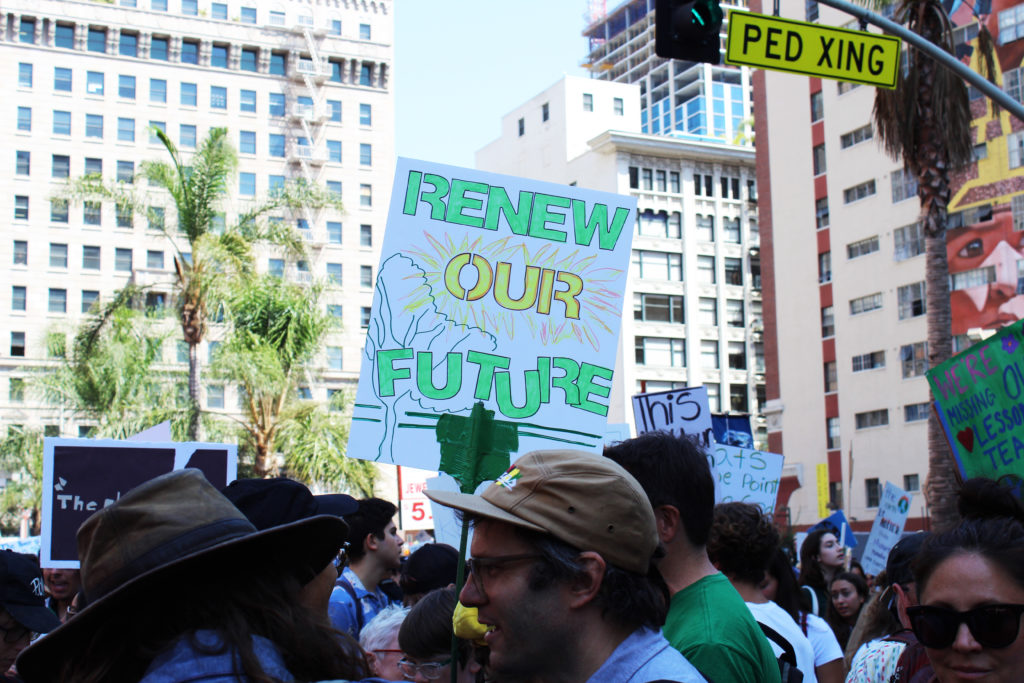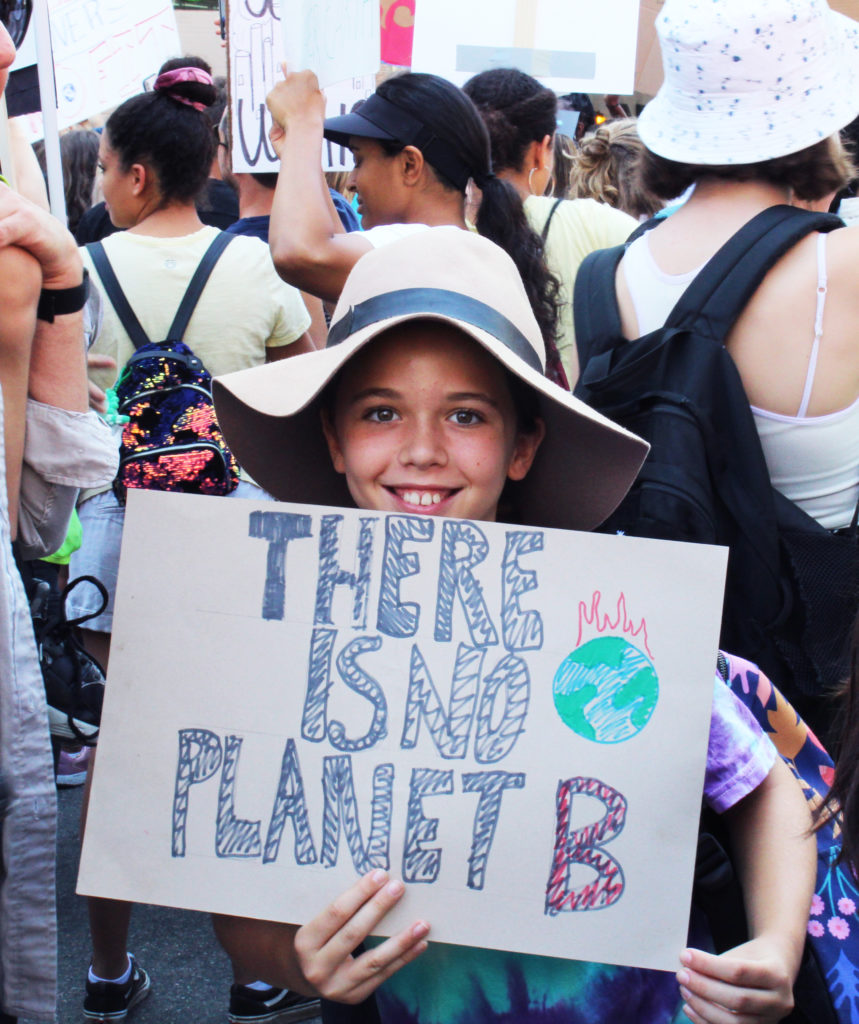
In Los Angeles, thousands marched toward City Hall for the Global Climate Strike Sept. 20. Activists demonstrated in order to pressure leaders to take action at the United Nations Climate Action Summit in New York Sept. 23. The global movement began as a series of school strikes led by students, and the LA march was comprised of people of all ages standing in solidarity with students.
Climate change has been a topic of concern among scientists and world governments for decades, but the movement has recently gained momentum in the United States, where climate change denial has flourished among politicians and everyday people alike. However, as scientists come to the conclusion that humans are, in fact, causing climate change, and as 16-year-old Swedish climate activist Greta Thunberg and other environmental activists bring attention to climate change on social media, support for climate action is rapidly growing. This weekend’s strike — which involved over 2,500 events around the globe — was likely the largest climate protest in world history.
Elizabeth Abrams, a working mother, attended the strike with her husband and their young son.
“There’s really nothing more important that people could be paying attention to right now besides climate change. Nothing else matters if we ignore this,” Abrams said.
Scientists predict that climate change will pose many challenges to humanity in the near future. Climate change can cause the loss of essential biodiversity that humans need for medicine, in addition to extreme weather: fires, heatwaves, hurricanes, droughts and floods. These effects are also predicted to get dramatically worse if the average temperature of Earth increases by 1.5 degrees Celsius. With so many threats to the human race, protesters of all ages expressed worry and fear of what might happen if climate change is not addressed, including fifth grader Ava Behjat, who attended the strike with her family.
“I don’t want all the animals to go extinct,” Behjat said.
College students Riley Stockard and Shoshana Brustin attended the strike despite admitting often feeling helpless under the weight of climate change.
“With all that’s been going on with climate change, it’s very easy to get apathetic and want to roll over and die about it,” Stockard said. “I think for me, it’s the loss of not only human life, but animal life, plant life — especially in developing countries that are gonna face the brunt of climate change before us in America do.”
Brustin agreed, sympathizing with victims of recent instances of extreme weather patterns.
“All of the predictions are so catastrophic. I mean, we’re already seeing the incredibly damaging effects of hurricanes in the Caribbean on small island communities, and it’s all so devastating,” Brustin said.

The feeling that Stockard describes is sometimes referred to as climate anxiety or eco-anxiety, which is an overwhelming feeling of helplessness or fear many young people experience when thinking about the impacts of climate change and their relative ability to make a difference. However, attending strikes and speaking out seems to be the best way to suppress those anxious feelings, Stockard said. Occidental student Maren Frost (first year) also believes that striking is an important way to combat climate change.
“Even though it’s not a vote, it’s really important. Every single person that’s here, it’s super important for them to be here to … communicate to policymakers what’s important to us,” Frost said.
While many strike organizers were demanding the implementation of policies that would reduce carbon emissions, fifth grader Ujin Chen’s reason for participating was rather simple.
“Everything will burn and everything will be dead and stuff. I’m worried about that,” Chen said. “We’re trying to ask [leaders] if they could change everything.”
Many protesters called for the implementation of the Green New Deal, a massive policy package that includes transitioning the United States away from fossil fuels and toward renewable energy while boosting the economy. Animal agriculture was another important issue for protesters. The greenhouse gases emitted by livestock as well as intentional deforestation to make room for farmland is at the forefront of many activists’ minds, including Pasadena resident Taylor Soloman.
“Animal agriculture and byproducts of animal agriculture contribute to 51 percent of carbon emissions. So the earth is getting hot because of meat,” Soloman said. “If every person here didn’t eat meat for one meal a day — one meal a week even — it would make a difference.”
Some people, such as co-president of Occidental College’s Oxy350 club McClaran Shirley (sophomore), believe that the United States should be leading the fight against climate change because of its relatively high carbon emissions compared to other countries.
“The government tries to push our environmental problems onto other third-world countries often. Also, things like exiting the Paris Climate Accord,” Shirley said. “We are contributing the most [to climate change] and doing the least as of right now. So if [the United States] could make a big difference, then it would make a big difference worldwide, I think.”
Oxy350, a club at Occidental College, transported students to and from the strike. As a chapter of the larger 350 organization, the club hosts events to spread awareness about climate change on campus and has led projects to make the college’s campus more sustainable, such as working with administrators to divest millions of dollars away from fossil fuels and into renewable energy. Shirley and her co-president Bergen Phelps (sophomore) are passionate about preserving the planet and advocating for environmental justice.
“The ocean is very threatened by climate change, just regarding the ecosystems. There’s issues like plastic pollution, but then there’s also ocean acidification and coral reefs dying and just everything is going extinct. So that’s personally what I care deeply about,” Shirley said. “It sort of expanded into a more general and politically-focused interest of mine.”
They also believe that Occidental College could do more to make its campus sustainable.
“Always soy. Always soy. Every time,” Phelps said in reference to the limited vegan/vegetarian options available at the Marketplace.

Protesters encourage students to get involved with climate activism, whether that means going vegan or attending a strike. George Dutton, UCLA faculty member and strike participant, admits that his generation put the burden on young people. He encourages students to step up and demand change.
“While we as the older generation totally screwed up … college students need to step up and remind their representatives and people in power — whether it’s in the business sector or the political sector — to act to save the planet for their own future,” Dutton said.
Elizabeth Abrams’ advice to students and community members alike is to resist apathy and remain active in the community.
“Just vote and don’t let apathy win. Be active in your community, vote every time you get a chance and pay attention to the people that are representing you,” Abrams said.
![]()



































